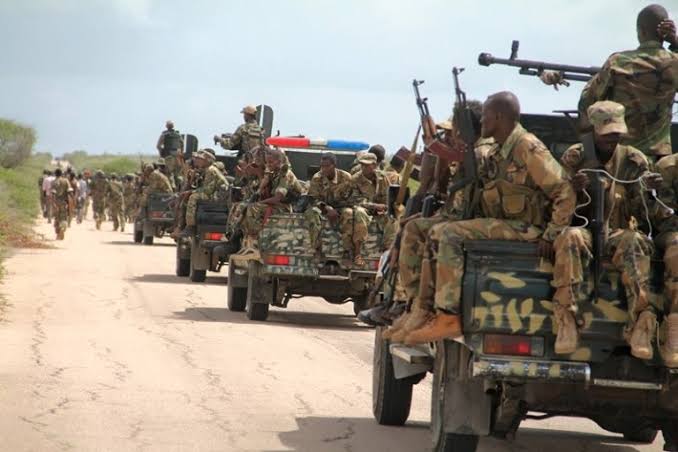Facebook Twitter (X) Instagram Somali Magazine - People's Magazine
Clashes broke out between Somalia’s federal forces and troops from the semi-autonomous Jubbaland region, highlighting internal political rivalries that threaten to overshadow efforts to combat al-Shabaab.
The violence unfolded in the Lower Jubba region, near Ras Kamboni, a strategically significant area close to the Kenya-Somalia border. The clashes come amidst disputes over regional elections and just weeks before the mandate of the African Union Transition Mission in Somalia (ATMIS) expires, raising concerns about security in the region.
Drone Strikes and Ground Assaults
On Wednesday, federal troops launched drone attacks on Jubbaland forces in Ras Kamboni, according to Adan Ahmed Haji, Jubbaland’s Assistant Security Minister. “Hundreds of federal forces surrendered and fled toward the Kenyan border,” he claimed, adding that Jubbaland fighters had seized control of Ras Kamboni.
However, Somalia’s Defense Minister Abdulkadir Mohamed Nur countered that Jubbaland forces initiated the clashes. He stated the federal troops were in the region to occupy bases vacated by ATMIS troops.
Major Abdirahman Osman, a Jubbaland soldier, reported at least 10 fatalities during the conflict. These claims have yet to be independently verified.
Regional Implications and Historical Context
The ongoing dispute between Jubbaland and the Somali federal government stems from political tensions following Jubbaland’s controversial re-election of Ahmed Mohamed Islam Madobe as its regional president in November. Mogadishu opposed the election, citing its lack of federal oversight.
Both sides have issued arrest warrants for each other’s leaders, exacerbating divisions. The region’s shoreline, bordering Kenya, includes a contested maritime zone believed to hold valuable oil and gas deposits, further heightening tensions.
Challenges for Peacekeeping Efforts
The timing of these clashes is critical. The ATMIS mandate expires within weeks, with no concrete agreement on a replacement mission or funding mechanisms. Opposition leaders in Somalia criticized the use of federal forces in local political disputes, emphasizing their role in combating al-Shabaab rather than internal rivalries.
“The armed forces should not be used for political purposes,” stated a joint release by three prominent opposition figures. “Federal and Jubbaland forces must unite against al-Shabaab, Somalia’s common enemy.”
Impact on the Kenya-Somalia Border
The violence has already disrupted life along the Kenya-Somalia border, particularly in Mandera County, Kenya. Kenyan officials have expressed concerns about potential refugee flows and heightened insecurity.
Mandera County Governor Ali Roba confirmed injuries among Kenyan civilians due to the fighting. Kenya, which rejected a 2021 UN court ruling favoring Somalia in a maritime border dispute, has urged diplomatic resolutions to avoid further escalation.
Calls for Dialogue
Regional bodies, including the African Union and the Intergovernmental Authority on Development (IGAD), have urged both sides to pursue dialogue. Moussa Faki Mahamat, AU Commission Chairperson, highlighted the importance of regional stability, calling for immediate negotiations to prevent further bloodshed.
The Road Ahead
As Somalia grapples with internal divisions, the country faces critical decisions about its security and governance structures. Resolving the Jubbaland dispute through dialogue and collaboration will be essential to maintaining stability and advancing counterterrorism efforts against al-Shabaab.

